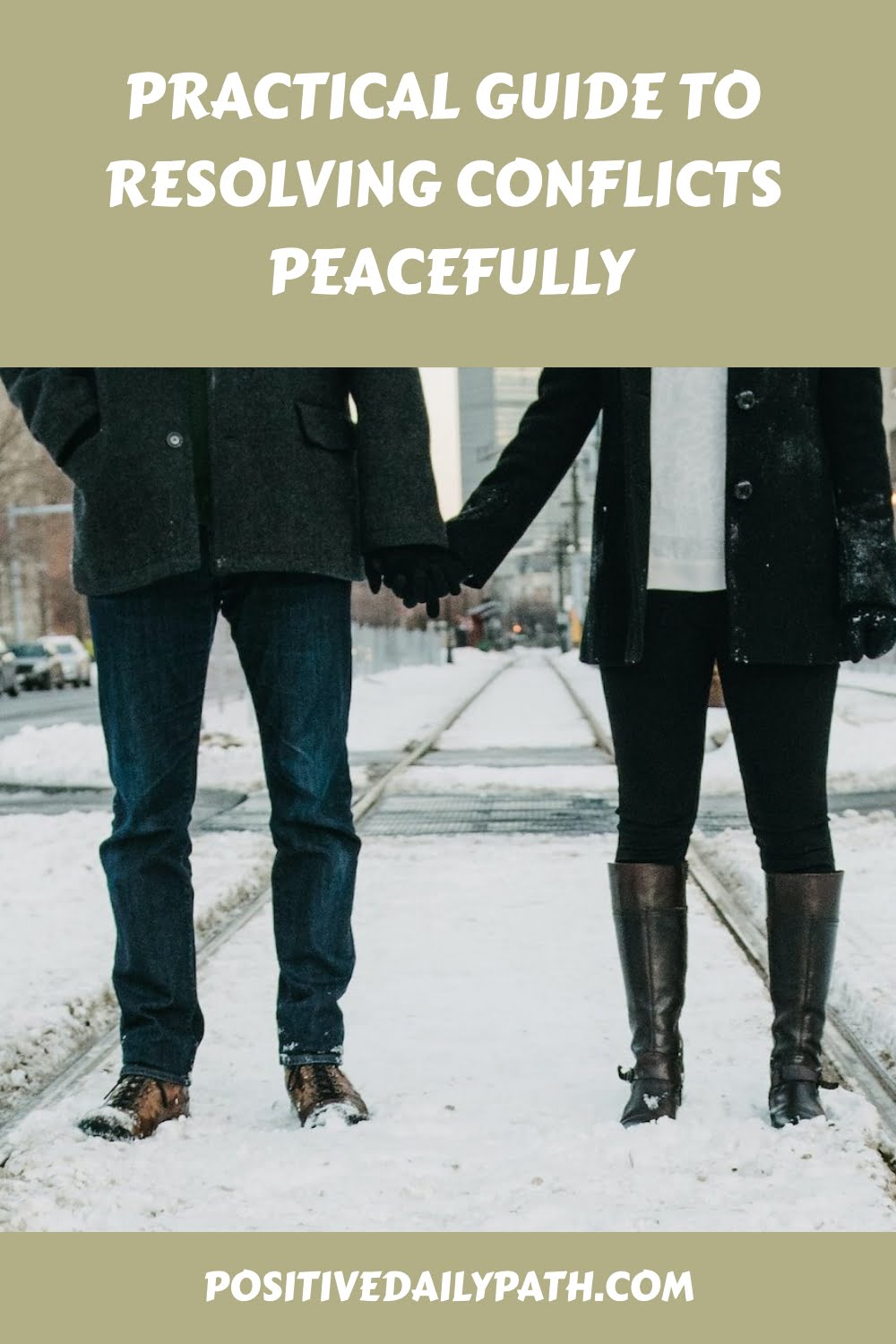Welcome to our comprehensive guide to resolving conflicts peacefully. As couples, we may face disagreements and misunderstandings that can leave us feeling frustrated and disconnected. However, conflicts can also be opportunities for growth, understanding, and strengthening our relationships. In this guide, we will provide practical strategies and techniques for couples who want to navigate conflicts in a healthy and productive way. Let's dive in and discover how to resolve conflicts peacefully.
Key Takeaways:
- Couples can enhance their relationships by navigating conflicts in a healthy and productive way.
- This guide will provide practical strategies and techniques for couples who want to resolve conflicts peacefully.
- Resolving conflicts peacefully requires effective communication, empathy, and collaborative problem-solving.
- Couples can benefit from seeking professional support and cultivating forgiveness and healing after conflicts.
Understanding the Nature of Conflicts
Before we can begin to manage conflicts in our relationships, it's important to understand their nature. Conflicts are a natural aspect of any relationship, and they can arise due to different perspectives, values, and beliefs. Misunderstandings and differences in communication styles can also escalate conflicts, leading to hurt feelings and resentment.
Resolving conflicts in relationships requires us to be aware of our own emotions and how they may contribute to the situation. It's important to approach conflicts with an open mind, a willingness to listen, and a desire to find a solution that benefits both parties.
The Common Causes of Conflicts
Conflicts can arise from a variety of different sources, including:
- Unresolved issues or past events
- Differences in values or beliefs
- Misunderstandings due to different communication styles
- Power imbalances in the relationship
- External stressors, such as financial or work-related issues
How Can We Manage Conflicts in Relationships?
Managing conflicts in relationships requires us to remain calm and level-headed, even in the face of intense emotions. It's important to communicate openly and honestly, while avoiding blame or criticism. We should aim to truly listen to the other person's perspective, seeking to understand their point of view rather than simply rebutting it.
Conflict resolution should be approached as a collaborative effort, with both parties working together to find a solution that satisfies everyone involved. This often involves compromise and a willingness to see things from different angles.
By understanding the nature of conflicts, we can approach them in a more constructive and productive way. We can develop the tools and skills necessary to manage conflicts in a healthy way, improving communication and strengthening our relationships.
Creating a Safe and Supportive Environment
At the heart of peaceful communication and resolving conflicts in a healthy way is creating a safe and supportive environment. This means establishing a foundation of trust and mutual respect where both partners feel heard and valued.
One key element of creating this environment is open communication. This involves setting aside time to talk and actively listening to your partner without interrupting or being defensive. It also means using “I” statements instead of “you” statements to express how you feel without blaming or accusing your partner.
Another important aspect of a safe and supportive environment is empathy. This means stepping into your partner's shoes and trying to understand their perspective, even if you don't agree with it. It also means validating their emotions and showing that you care about how they feel.
Finally, cultivating a safe and supportive environment involves practicing forgiveness and letting go of grudges. This means acknowledging mistakes and taking responsibility for your actions, as well as being willing to forgive your partner and move forward together.
By creating a space of openness, respect, empathy, and forgiveness, we can lay the foundation for resolving conflicts peacefully and strengthening our relationship.
Identifying Triggers and Emotional Patterns
Resolving conflicts in relationships can be challenging. However, recognizing triggers and emotional patterns is a critical step towards effective conflict resolution. When we understand what triggers our emotional responses, we can better manage our reactions and communicate our needs in a healthy way.
Similarly, identifying our partner's triggers can help us respond more compassionately and avoid unnecessary conflicts. It's important to note that triggers can be anything from a specific tone of voice to a particular circumstance that reminds us of a past hurt.
One effective technique for identifying triggers is to reflect on past conflicts and consider what factors may have contributed to the escalation. This can help us recognize patterns in our emotional responses and gain insight into what triggers us.
Another useful strategy is to practice mindfulness and self-awareness. When we are mindful, we are more in tune with our thoughts and emotions, which can help us identify triggers as they arise. Additionally, practicing self-awareness can help us understand our true needs and desires behind our emotional reactions.
Once we have identified our triggers, we can communicate them with our partner in a non-confrontational way. By expressing our needs and boundaries, we can work towards resolving conflicts in a healthy way and prevent unnecessary misunderstandings.
Effective Communication Skills for Peaceful Conflict Resolution
Effective communication skills are crucial for resolving conflicts peacefully. In this section, we will explore techniques that can enhance communication between couples and turn disagreements into opportunities for growth and understanding.
Using “I” Statements
Using “I” statements is a communication technique that can help you express yourself clearly without blaming or criticizing your partner. Instead of saying “You always do this” or “You never do that,” try saying “I feel upset when this happens” or “I need this from you.” This technique can help you take ownership of your feelings and needs, making it easier for your partner to understand and respond positively.
Active Listening
Active listening is a technique that involves fully concentrating on what your partner is saying without interrupting or judging. This technique can help you understand your partner's perspective and show that you value their thoughts and feelings. To practice active listening, maintain eye contact, nod and respond appropriately, and summarize what your partner said to ensure you understood their message correctly.
Non-Verbal Communication
Non-verbal communication can convey as much meaning as verbal communication. Paying attention to your body language and tone of voice can help you express yourself clearly and avoid misunderstandings. Make sure your body language is open and relaxed, and your tone of voice is calm and respectful.
Practice Peaceful Communication
Practicing peaceful communication is essential for resolving conflicts in a healthy way. This approach involves avoiding criticism, blaming, and defensiveness, and instead, focusing on understanding and collaboration. By using the techniques outlined above, you can cultivate a peaceful communication style that allows you to express yourself freely while also creating a safe and supportive environment for your partner.
Practicing Empathy and Understanding
At the heart of resolving conflicts in a healthy way lies the ability to empathize with and understand your partner's perspective. When we take the time to step into our partner's shoes, we can begin to see their point of view and validate their emotions.
“It's not about agreeing with your partner, it's about understanding and respecting their feelings.”
One effective technique for practicing empathy is active listening. When your partner speaks, give them your full attention, avoiding distractions and interruptions. Paraphrase what they say and ask open-ended questions to encourage them to share more. When you show genuine interest in what they have to say, you create a safe environment where they feel heard and understood.
Validation and Empathy
Validation is another crucial aspect of practicing empathy. When we validate our partner's emotions, we acknowledge and accept their feelings, even if we don't necessarily agree with them. Validating your partner's emotions can help create a safe space where they feel comfortable sharing their thoughts and feelings with you.
For instance, “I can understand why you would feel that way.”
By showing your partner empathy and validation, you can increase your emotional connection and build trust, even during tough times.
Finding Common Ground
In situations where you and your partner have conflicting opinions, it's important to find common ground. Instead of focusing on who's right or wrong, focus on finding a mutually satisfying resolution that benefits both parties.
One helpful strategy for finding common ground is compromise. By compromising, you and your partner can work together to find a solution that meets both of your needs.
| Compromise Example | Non-Compromise Example |
|---|---|
| We can split the housework in half so we both have an equal workload. | You should do more housework because you don't work as many hours as I do. |
Remember that conflicts are an opportunity for growth and understanding within your relationship. By practicing empathy and finding common ground, you can transform conflicts into opportunities for connection and strengthen your bond with your partner.
Collaborative Problem-Solving
Collaborative problem-solving is an effective approach to resolving conflicts in a healthy way. By working together as a team, couples can find mutually satisfying solutions that address the needs and concerns of both partners. This technique can be particularly useful when dealing with complex or long-standing conflicts that require a joint effort to resolve.
One of the keys to successful collaborative problem-solving is to approach the situation with an open mind and a willingness to listen to your partner's perspective. Avoid getting caught up in a “win-lose” mentality and instead focus on finding a solution that benefits both parties.
A helpful technique to facilitate the collaborative problem-solving process is brainstorming. Start by generating a list of potential solutions, no matter how unconventional or unrealistic they may seem. Then, work together to evaluate each idea, considering its potential benefits and drawbacks. By doing so, you can narrow down the list to the most viable options and begin to develop a plan for implementation.
Another useful tool for collaborative problem-solving is compromise. This involves finding a middle ground that takes into account both partners' needs and desires. By making small concessions and finding creative solutions, couples can often arrive at a mutually satisfying outcome.
Remember, the goal of collaborative problem-solving is not to place blame or find fault, but rather to work together to find a solution that benefits both parties. By approaching conflicts with an open mind and a willingness to listen and compromise, couples can build stronger relationships and resolve conflicts in a healthier way.
Managing Anger and Emotional Intensity
When conflicts arise, it's natural to experience strong emotions such as anger, frustration, or sadness. However, managing these emotions is essential for resolving conflicts in a healthy way.
One effective strategy for managing anger is to take a step back and breathe deeply before responding. This can help to calm your body and mind, allowing you to approach the situation with more clarity and objectivity.
Remember, managing conflicts in relationships requires being able to express your emotions in a healthy way, without hurting your partner or damaging the relationship.
It's also important to avoid personal attacks or criticism when discussing sensitive topics. Instead, focus on expressing how the situation makes you feel and your perspective on the issue.
Recognizing Triggers and Emotional Patterns
Another important aspect of managing emotional intensity is recognizing your own triggers and emotional patterns. Identify what situations or behaviors tend to trigger strong emotions in you and communicate this with your partner.
By being aware of each other's triggers, you can work together to avoid or minimize situations that may lead to conflict. Additionally, recognizing and understanding your own emotional patterns can help you practice self-awareness and regulate your emotions more effectively.
De-Escalating Tense Situations
When conflicts do become heated, it's essential to have strategies in place to de-escalate the situation. This may include taking a break to cool off, changing the environment to create a more relaxed atmosphere, or employing humor to diffuse tension.
Active listening is another effective tool for de-escalating tense situations. Make an effort to truly listen to your partner's perspective and validate their emotions, even if you disagree with their point of view. This can help to create a sense of understanding and mutual respect, which can pave the way for a more productive discussion.
In conclusion, managing anger and emotional intensity in conflicts is key to resolving conflicts in a healthy way. By practicing self-awareness, active listening, and effective communication, we can navigate conflicts with empathy and understanding, strengthening our relationships in the process.
Seeking Professional Support
At times, conflicts can become too complex or deep-rooted, making it challenging to resolve them internally. Seeking professional support can be an effective way to gain new perspectives, improve communication skills, and identify underlying issues that may be contributing to conflicts.
There are several conflict resolution strategies for couples that a trained professional can help with:
- Mediation: A neutral third party facilitates a conversation between the couple and assists them in finding common ground and mutually acceptable solutions.
- Couples Therapy: A therapist can help the couple improve communication skills, develop empathy, and work through issues that may be hindering conflict resolution.
- Individual Therapy: Each person in the relationship may benefit from individual therapy to address any personal issues that are affecting the relationship. This can ultimately lead to more effective conflict resolution.
It's essential to choose a qualified professional who specializes in conflict resolution and has experience working with couples. Before selecting a therapist or mediator, consider their education, training, and experience, and ensure that you feel comfortable working with them.
If you're unsure where to start, ask for a referral from your healthcare provider or consult professional organizations such as the American Association for Marriage and Family Therapy or the National Association of Social Workers.
Cultivating Forgiveness and Healing
When conflicts occur in relationships, it's natural to feel hurt, angry, or resentful towards your partner. However, holding onto these negative emotions can make it difficult to move forward and find resolution. Forgiveness and healing are essential components of resolving conflicts in a healthy way.
Forgiveness does not mean forgetting or condoning hurtful actions. Rather, it involves letting go of anger and resentment and choosing to move forward with compassion and understanding.
Healing takes time and effort, and it often begins with open communication. When both partners are willing to listen, validate each other's feelings, and work towards a common goal, healing can occur.
Addressing the roots of the conflict is also crucial for healing. By identifying and addressing underlying issues, couples can work towards creating a stronger and healthier relationship.
Keep in mind that forgiveness and healing are ongoing processes. It's normal to experience setbacks and challenges along the way. However, by committing to the process and working together, couples can create a deeper understanding and connection with one another.
Conclusion
Resolving conflicts peacefully is not an easy task, but it's a crucial one if we want to build and maintain healthy relationships. By implementing the strategies and techniques we've discussed in this guide, we can transform conflicts into opportunities for growth and understanding.
Commit to Peaceful Conflict Resolution
Remember that conflict resolution is an ongoing process that requires commitment, patience, and a willingness to listen and understand. We can start by creating a safe and supportive environment that fosters open communication, active listening, and empathy. By practicing effective communication skills and collaborative problem-solving, we can work together to find mutually satisfying solutions.
Seek Professional Support When Needed
It's important to recognize that sometimes conflicts may require professional support. If conflicts persist or are deeply rooted, seeking couples therapy or counseling can help us address underlying issues and improve our conflict resolution skills.
Cultivate Forgiveness and Healing
Forgiveness and healing are essential for moving forward after conflicts. By recognizing and validating our own and our partner's emotions, we can rebuild trust, let go of resentment, and cultivate a stronger bond within our relationship.
Together, we can commit to resolving conflicts peacefully and create a more harmonious and fulfilling relationship.
SEO Keywords: couples resolving conflicts peacefully
FAQ
How do I resolve conflicts peacefully with my partner?
To resolve conflicts peacefully, it is important to cultivate open communication, active listening, and empathy within your relationship. By practicing effective communication skills, identifying triggers and emotional patterns, and implementing collaborative problem-solving techniques, you can turn disagreements into opportunities for growth and understanding.
What are some common causes of conflicts in relationships?
Conflicts in relationships can arise from a variety of reasons, including differences in communication styles, unmet needs, financial disagreements, conflicting values or goals, and unresolved past issues. It is important to understand that conflicts are a normal part of any relationship, and addressing them with patience and understanding can lead to resolution and personal growth.
How can I create a safe and supportive environment for peaceful conflict resolution?
Creating a safe and supportive environment starts with fostering open communication, active listening, and empathy. It is essential to create a space where both partners feel comfortable expressing their thoughts and emotions without fear of judgment. By practicing peaceful communication techniques and validating each other's emotions, you can create an atmosphere of trust and understanding.
Why is it important to identify triggers and emotional patterns?
Identifying triggers and emotional patterns is crucial for resolving conflicts effectively. By recognizing the factors that contribute to conflicts, both within yourself and your partner, you can develop a better understanding of each other's needs, reactions, and triggers. This self-awareness allows for more compassionate and constructive communication, leading to more successful conflict resolution.
What are some effective communication skills for resolving conflicts?
Effective communication skills are essential for resolving conflicts peacefully. Some techniques that can enhance communication include using “I” statements to express your feelings without blaming, practicing active listening to fully understand your partner's perspective, and utilizing non-verbal communication to convey empathy and support. By focusing on clear and respectful communication, you can promote understanding and find mutually satisfying solutions.
How can I practice empathy and understanding during conflicts?
Practicing empathy and understanding involves stepping into your partner's shoes, validating their emotions, and finding common ground even when you disagree. By actively listening, seeking to understand your partner's perspective, and expressing empathy towards their feelings, you can foster a deeper connection and create a more harmonious resolution to conflicts.
What is collaborative problem-solving, and how can it help resolve conflicts?
Collaborative problem-solving is an approach that involves working together to find mutually satisfying solutions. By encouraging brainstorming, compromising, and seeking win-win outcomes, collaborative problem-solving can help couples navigate conflicts and reach resolutions that honor both partners' needs and desires. This approach promotes a sense of teamwork and strengthens the bond between partners.
How do I manage anger and emotional intensity during conflicts?
Managing anger and emotional intensity is crucial for productive conflict resolution. Techniques such as taking deep breaths, pausing before responding, and using calming techniques like meditation or exercise can help you regulate your emotions. It is important to express your emotions in a constructive manner, avoiding destructive behaviors or words that may escalate the conflict. By managing your anger effectively, you can maintain a respectful and productive dialogue.
When should I seek professional support for resolving conflicts?
Sometimes conflicts may require professional support, especially if they are deeply rooted or recurring. If you find that conflicts persist despite your efforts, or if they are causing significant distress in your relationship, seeking couples therapy or counseling can provide valuable insights and guidance. A trained professional can help you navigate challenges, strengthen your conflict resolution skills, and create a healthier and more fulfilling relationship.
How can I cultivate forgiveness and healing after conflicts?
Cultivating forgiveness and healing is essential for moving forward after conflicts. It involves rebuilding trust, letting go of resentment, and creating a stronger bond within your relationship. Techniques such as practicing forgiveness, engaging in open and honest conversations, and focusing on the present rather than dwelling on past conflicts can contribute to healing and growth. By prioritizing forgiveness and healing, you can create a more resilient and loving relationship.




